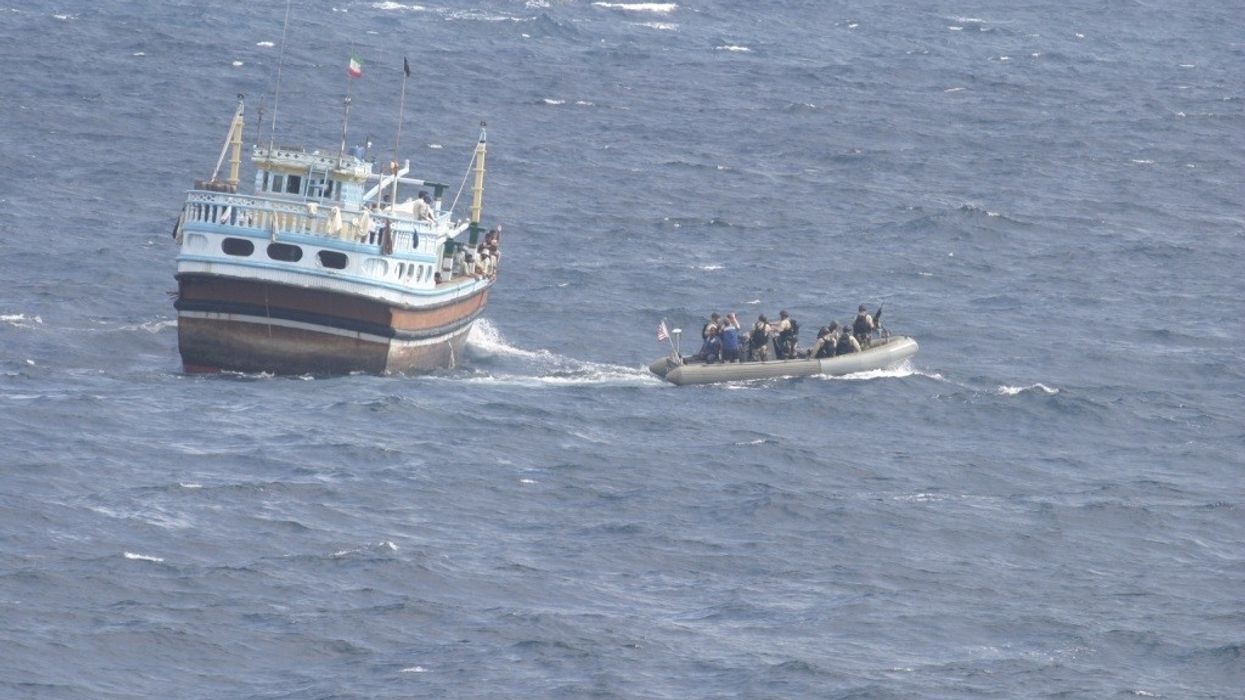The Indian Navy said on Tuesday (30) that it had successfully freed an Iranian fishing vessel that had been hijacked by Somali pirates.
This intervention marks the second such instance within two days, following a recent surge in pirate attacks on shipping in the Indian Ocean.
The warship INS Sumitra "compelled the safe release" of the 19 Pakistani crew members and the Iranian-flagged Al Naeemi fishing vessel, the spokesman said.
A total of "11 Somali pirates" had taken the crew hostage, the navy said.
Photographs released by the navy showed Somali pirates wielding AK-47 rifles standing on the boat, and another with a navy helicopter hovering overhead.
Further photographs showed commandos boarding the fishing boat in the dark, then standing with rifles over a group of pirates, the men kneeling at their feet with their hands tied behind their backs on the ship's deck.
The rescue took place overnight Monday off the Somali coast, some 850 nautical miles (1,574 kilometres) west of the Indian city of Kochi in Kerala.
It came just 36 hours after India said its forces had freed 17 crew members of the Iranian-flagged Iman fishing vessel, also taken by Somali pirates.
In a third case, commandos from the Seychelles on Monday freed the Sri Lankan fishing vessel Lorenzo Putha-4 and safely rescued its six-man crew.
That boat had been hijacked three days earlier by Somali gunmen about 840 nautical miles (1,555 kilometres) southeast of Mogadishu, the capital of impoverished and war-ravaged Somalia.
The hijackings off Somalia have fuelled concerns about a resurgence of Indian Ocean raids by opportunistic pirates, coming on top of a separate surge in attacks launched by Yemen's Iran-backed Huthi rebels.
Huthi gunmen have launched scores of attacks in the Red Sea and Gulf of Aden targeting Israeli-linked vessels in response to Israel's war against the Palestinian militant group Hamas in Gaza.
International naval forces have been diverted north from the Gulf of Aden into the Red Sea, sparking fears that pirates will exploit the security gap, with the first successful case of Somali piracy since 2017 recorded in December.
Pirate attacks off the Somali coast peaked in 2011 -- with gunmen launching attacks as far as 3,655 kilometres (2,270 miles) from the Somali coast in the Indian Ocean -- before falling off sharply after international navies sent warships and commercial shipping deployed armed guards.
Somali pirates previously would use high-powered open skiffs to seize fishing vessels they could then use as "motherships" to travel far further into the Indian Ocean to attack larger ships.
As well as rescuing the crew and freeing the boats, India said its operations were preventing "misuse of fishing vessels as motherships for further acts of piracy" on larger merchant vessels.
India's navy has been deployed continuously off Somalia since 2008, but in December sent a far larger force -- including three guided-missile destroyers and P-8I reconnaissance aircraft to "maintain a deterrent presence" after a string of shipping attacks.
India, which has close trade ties with Iran, has not joined the US-led maritime task force in the Red Sea to protect international shipping against attacks by Huthi rebels.
In December, Somali pirates hijacked the Malta-flagged bulk carrier MV Ruen.
After releasing one injured sailor into the care of the Indian navy, the pirates took the MV Ruen and its remaining 17 crew members to Somalia's semi-autonomous state of Puntland.
(AFP)




